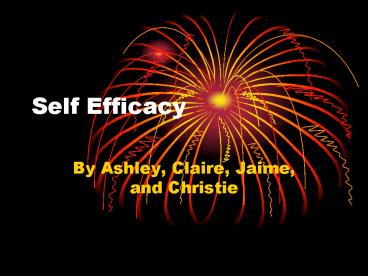Self Efficacy - PowerPoint PPT Presentation
1 / 13
Title:
Self Efficacy
Description:
Self efficacy should not be confused with self-esteem. ... does not necessarily ensure success, but self-disbelief assuredly spawns failure. ... – PowerPoint PPT presentation
Number of Views:1397
Avg rating:5.0/5.0
Title: Self Efficacy
1
Self Efficacy
- By Ashley, Claire, Jaime, and Christie
2
Self Efficacy is
- A persons sense of being able to deal
effectively with a particular task.
3
Efficacy vs. Esteem
- Self efficacy should not be confused with
self-esteem. - Self-esteem is the value each of us place on our
own characteristics, abilities, and behaviors.
4
Sources of Self Efficacy
- Mastery Experiences
- Vicarious Experiences
- Social Persuasion
- Physiological or Emotional Feedback
5
Mastery Experiences
- Our own direct experiences
- Based on past experiences, our successes heighten
and our failures lower our self efficacy in a
particular area.
6
Vicarious Experiences
- Accomplishments that are modeled by someone else.
- The more the student relates to the model, the
greater the impact will be on their self
efficacy. - This could affect them positively or negatively.
7
Social Persuasion
- Specific performance feedback. (AKA Pep talk!)
- The encouragement helps the student attempt to
try new things on their own. - It will mean more to them if the person they are
getting feedback from is believable and
trustworthy.
8
Physiological/Emotional Feedback
- A level of arousal affects self efficacy,
depending on how it is interpreted by the person. - The feelings one has toward a given task.
- Example Worried, anxious, excited, sweaty palms.
9
Motivation
- Goal setting
- When one has a high sense of self efficacy in a
certain area, they set higher goals and are not
afraid to fail. - However, when one has a low sense of self
efficacy, they tend to give up easily, not try at
all, or set very low goals for themselves.
10
Motivation
- Attributions
- When you have a strong sense of self efficacy for
a given task, you attribute your failures to a
lack of effort. - But when you have a low sense of self efficacy,
you tend to attribute your failures to lack of
ability.
11
Motivation
- Children and adults who are optimistic about the
future, believe that they are effective and have
high expectations are more mentally and
physically healthy, less depressed, and are more
motivated to achieve in what they do.
12
School Improvement
- For students, there are 3 ways their efficacy is
increased - Adopting short terms goals so information is
easier to process - Are taught to use specific learning strategies
- And receive awards based on achievement not just
engagement.
13
Conclusion
- Self-belief does not necessarily ensure success,
but self-disbelief assuredly spawns failure. -
Bandura































